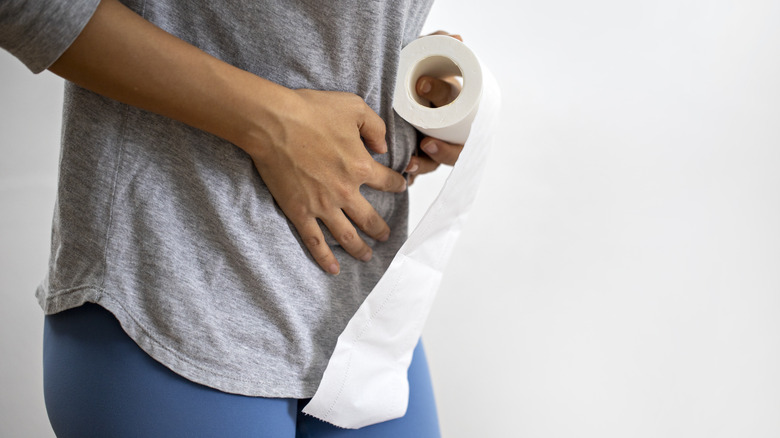How Often You Should Really Be Pooping, According To A Gastroenterologist
If you think about how often a person normally poops, don't strain too hard. In an exclusive interview, Health Digest spoke with Dr. Kenneth Brown, one of the top gastroenterologists in Plano, Texas, and the host of the "Gut Check Project" podcast to learn more about regular bowel movements.
When it comes to how often people should poop, the answer can vary. "A healthy frequency can range from three times a day in one person to three times a week in another," says Dr. Brown. "It is important to note that there is no set normal frequency for bowel movements, it just depends on if you are not having discomfort with your frequency. The most important thing is that you are comfortable with your bowel movements, you feel fully evacuated and you do not have discomfort," he notes.
If you are not having regular bowel movements, it may be due to constipation. "Constipation is defined as having fewer than three bowel movements per week, or having hard, dry stools that are difficult to pass," Dr. Brown explains. "It can also be accompanied by other symptoms such as abdominal pain, bloating, and feeling like you can't completely empty your bowels."
Constipation can lead to a long list of issues like abdominal pain or cramps, anal fissure, bloating, fecal impaction, overflow diarrhea, and in severe cases, it can lead to an emergency known as bowel obstruction. Luckily, Dr. Brown has a few tips to help keep you regular.
Tips for regular bowel movements
Dr. Brown notes that there are several things you can do to help keep your bowel movements regular, including eating a high-fiber diet and drinking lots of water. "Foods high in fiber, such as fruits, vegetables, whole grains, and legumes can help keep your stools soft and promote regular bowel movements," Dr. Brown explains. "Staying hydrated can help prevent constipation by keeping stools soft and moist." You should also exercise regularly because it can help stimulate the muscles in your intestines and promote regular bowel movements.
Additionally, it is important not to ignore the urge to go. "When you feel the need to have a bowel movement, try to go as soon as possible," Dr. Brown states. "If you delay or ignore the urge, your stools can become harder and more difficult to pass." Don't try to strain either, because that can lead to hemorrhoids and fissures. Instead, Dr. Brown recommends that you change your angle of defecation. "Use a Squatty Potty or stool to get your knees above your hips and lean just slightly forward," he explains. "This is a more natural position to defecate and helps the stool evacuate."
Dr. Brown also suggests that you leave your phone behind when you go to the restroom. "Many people can become distracted searching social media, and this can lead to extended time on the toilet."
If you still have constipation, talk with your doctor about over-the-counter medications and supplements that can help.
Risks of holding in your poop
As Dr. Brown points out, it's important to listen to your body and go as soon as you need to go. Unfortunately, however, that may not always be possible. Whether you're on a long car ride or the line is backed up in a public restroom, sometimes, we may be forced to hold in our poop. In fact, results of a survey conducted by OnePoll in connection with MiraLax revealed that out of 2,000 respondents, 7 out of 10 people voiced they would rather hold in their bowel movement than go number two in a public bathroom. So much so, that the average wait time participants reported enduring in order to relieve themselves in the privacy of their own homes was 2.5 hours.
While not usually harmful when done only periodically, holding in your poop may potentially lead to incontinence in more serious instances (via MedicalNewsToday). Particularly in the event of distention, in which the rectum becomes stretched, this can result in a loss of physical sensation. That's where incontinence can come into play, as a lack of feeling in the area may lead to involuntary bowel movements (via NHS).
When to reach out to your doctor
As previously mentioned, how often everyone poops will be different based on a variety of factors. However, if you notice changes in your own natural bowel movement rhythm, it may warrant a trip to your doctor's office, particularly if these changes persist for several days. This not only includes changes in frequency but also changes in color or consistency. For example, seek prompt medical attention for stool that is dark red, maroon, or black in color (via Cleveland Clinic). Stool that is clay or tar-like should also be reported to your physician. This is also true for mildly loose or watery stool (diarrhea) that persists for upwards of two weeks. However, speak to a healthcare professional if more severe diarrhea is ongoing for more than two days for adults.
Generally speaking, going more than three days without pooping is considered too infrequent (per Cleveland Clinic). However, the opposite can also be true. In the event that you notice an increase in bowel movement frequency accompanied by symptoms such as abdominal pain, blood or mucus in your stool, or unusual changes in volume or appearance (via Mayo Clinic), don't hesitate to contact your doctor.




